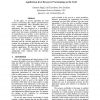Free Online Productivity Tools
i2Speak
i2Symbol
i2OCR
iTex2Img
iWeb2Print
iWeb2Shot
i2Type
iPdf2Split
iPdf2Merge
i2Bopomofo
i2Arabic
i2Style
i2Image
i2PDF
iLatex2Rtf
Sci2ools
102
click to vote
ESCIENCE
2006
IEEE
2006
IEEE
Application-Level Resource Provisioning on the Grid
In this paper, we present algorithms for Grid resource provisioning that employ agreement-based resource management. These algorithms allow userlevel resource allocation and scheduling of applications that are structured as a precedenceconstrained set of tasks. We present a provisioning model where the resource availability in the Grid can be enumerated as a set of slots. A slot is defined as a number of processors available from a certain start time for a certain duration at a certain cost. Using a cost model that combines the cost of resource allocation and the expected application runtime, we evaluate the performance of the Min-Min and of the Genetic algorithm (GA)-based heuristics for a range of synthetic applications. We show that the GA paired with a list scheduling algorithm can obtain significantly better solutions than the Min-Min heuristic alone.
Related Content
| Added | 11 Jun 2010 |
| Updated | 11 Jun 2010 |
| Type | Conference |
| Year | 2006 |
| Where | ESCIENCE |
| Authors | Gurmeet Singh, Carl Kesselman, Ewa Deelman |
Comments (0)

